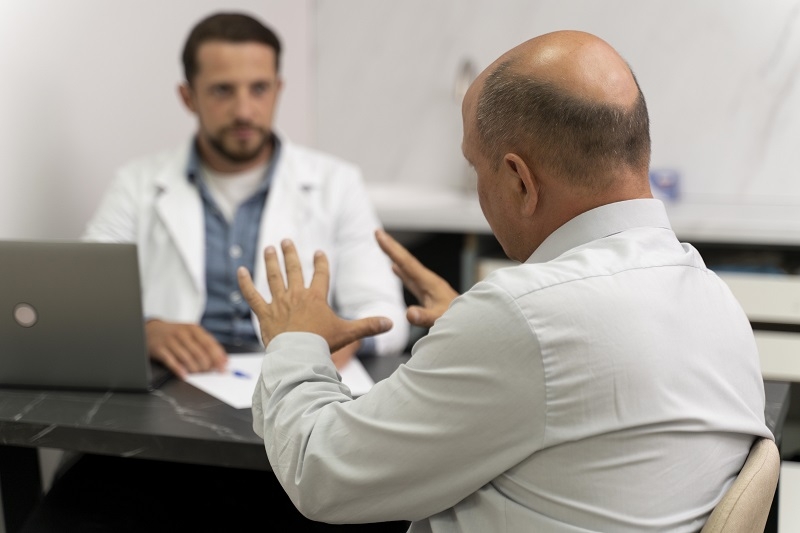Prostatitis demystified From symptoms to solutions

Prostatitis is a common condition affecting millions of men worldwide. Although common, it is still not talked about much despite the discomfort. It has a long-lasting impact on the physical and emotional well-being of men. Therefore, it should not be underestimated. It can be a challenging journey for those who experience it.
A walnut-sized gland found below the bladder that is present in all men is the prostate. The urethra passes through the prostate gland. A swollen and painful condition of the prostate is known as prostatitis. Adult men of any age can get prostatitis. The best urologist in Islamabad has shed some much-needed light on this misunderstood condition.
Types of prostatitis
There are generally four types of prostatitis.
Acute bacterial prostatitis - also known as Category 1 prostatitis, it happens when a urinary tract infection causes an infection in the prostate gland. This is the least common type and is short-lasting. You may feel a fever coming on and the onset of chills along with painful and frequent urination. Sometimes you’ll find trouble urinating as well. This type of prostatitis requires urgent medical treatment. Antibiotics may be given to treat the infection. If untreated, it can cause serious consequences.
Chronic bacterial prostatitis - Category 2 prostatitis usually affects young and middle-aged men. It may cause recurrent urinary tract infections as the bacteria become trapped in the prostate gland. These repeatedly-occurring UTIs are difficult to treat.
Chronic pelvic pain syndrome (CPPS) - this category 3 prostatitis is the most commonly occurring type. This may cause chronic pelvic pain, and pain in the perineum and genitals as well. It can affect men of all ages.
Asymptomatic inflammatory prostatitis - Category 4 prostatitis presents with no symptoms as the name suggests. It is usually discovered while diagnosing a different problem altogether. This causes inflammation but no other symptoms and does not need treatment.
Causes and risk factors
Microbes or a previous infection triggering your immune system are the causes of prostatitis. Other potential causes of bacterial prostatitis include bladder stones, prostate stones, urinary retention, and urinary tract infections.
Risk factors for chronic pelvic pain syndrome include stress, autoimmune diseases, and pelvic floor muscle spasms. You are also at an increased risk if you use a catheter, or have a medical procedure involving the urethra. Enlarged prostate or injury also aggravates the condition.
Symptoms of Prostatitis
The type and cause of prostatitis may determine the symptoms. People with asymptomatic inflammatory prostatitis do not have any presenting symptoms. Acute bacterial prostatitis may cause fever and chills.
CPPS and chronic bacterial prostatitis may cause symptoms such as:
-
Pain in the genitalia, perineum, and testicles that may extend to the lower back
-
Dysuria or painful urination
-
Frequent urge to urinate
-
Blood in semen
-
Weak urine flow
-
Erectile dysfunction
Nausea, vomiting, and an unpleasant odor in the urine may also be observed.
Treatment Options
If you have prostatitis, your doctor may treat your symptoms and your pain using carrying options including
Antibiotics
IV antibiotics may be prescribed to you followed by a course of oral ones for a month. If symptoms continue coming back, you may be asked to stay on low-dose antibiotics for longer.
Alpha-blockers
Prostatitis may sometimes be caused and aggravated by an enlarged prostatitis. Your doctor may give you alpha-blockers to reduce urinary tract obstruction and reduce risk of further infection.
Anti-inflammatories
You may be prescribed anti-inflammatory drugs along with other drugs to help mitigate the swelling and soreness in the prostate and surrounding areas.
Prostate massage
Prostate massage may help relieve the pressure you feel in the prostate. Fluid is drained from the prostate ducts and nearby muscles are relaxed by specialized physiotherapy.
Supplements
Some supplements are considered to have a positive effect on prostate health. Saw palmetto is frequently used in this condition. Bita-sitosterol has potent antioxidant and anti-inflammatory properties. Flower pollen extracts are used as a natural alternative to anti-inflammatory medicines in prostatitis. Selenium is also associated with a reduced case of prostate problems.
Complications associated with prostatitis
Some complications of acute or chronic prostatitis may include infection of the blood, prostatic abscesses, or an infection that spreads to the lower spine. Anxiety and depression amongst such men are common and need to be taken seriously. There is inconclusive evidence that prostatitis leads to prostate cancer in any way.
Final Thoughts
While medical treatment is available, know that a diet low in caffeine, spices, and alcohol will always be better. Fish, berries, and cruciferous vegetables are a great add-on. Remember to be active and exercise so that you do not remain sedentary for long.
- Industry
- Art
- Causes
- Crafts
- Dance
- Drinks
- Film
- Fitness
- Food
- Games
- Gardening
- Health
- Home
- Literature
- Music
- Networking
- Other
- Party
- Religion
- Shopping
- Sports
- Theater
- Wellness
- News


